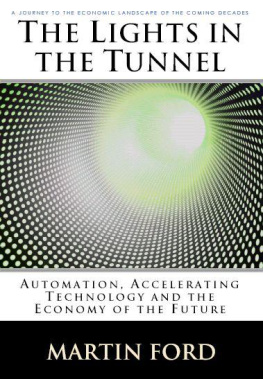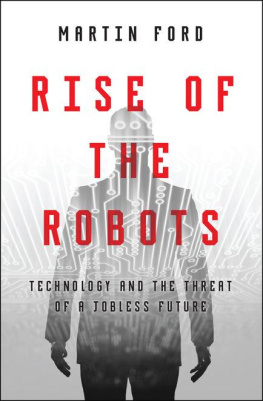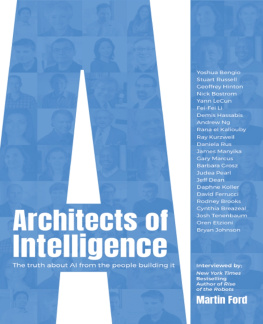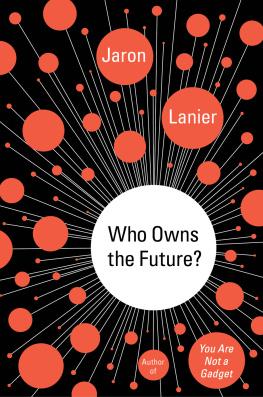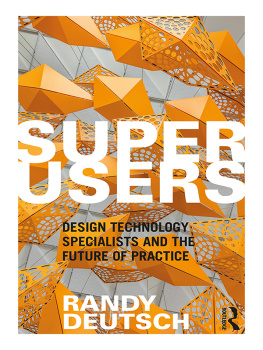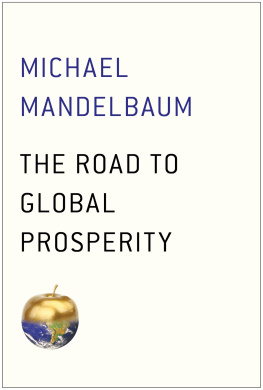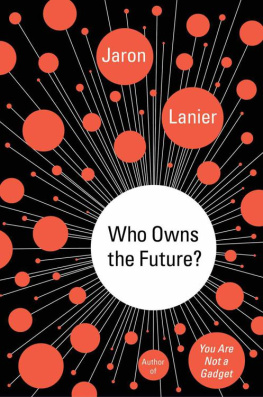
THE LIGHTS IN
THE TUNNEL
AUTOMATION, ACCELERATING
TECHNOLOGY AND THE
ECONOMY OF THE FUTURE
Martin Ford
Acculant Publishing
Copyright 2009 by Martin R. Ford
All Rights Reserved, including the right of reproduction in whole or in part in any form.
Published in the United States by Acculant Publishing.
Library of Congress Cataloging-in-Publication Data
Ford, Martin R.
The Lights in the Tunnel: Automation, Accelerating Technology and the Economy of the Future / Martin Ford
p. cm.
Includes bibliographical references
ISBN-10 1-4486-5981-7
ISBN-13 978- 1-4486-5981-4
1. EconomicsFuture Trends 2. EconomicsImpact of Advanced Technology on 3. Artificial Intelligence and Robotics 4. Computer Technology and Civilization 5. Technological Unemployment I. Title
The scanning, uploading and distribution of this book via the Internet without the permission of the publisher is illegal. Please purchase only authorized electronic editions. Your support of the authors rights is appreciated.
This book is available for purchase in paper and electronic formats at:
www.TheLightsintheTunnel.com
C ONTENTS
The Basis of the Free Market Economy:
Incentives
A Note to Kindle Users
The printed edition of this book employs both footnotes and endnotes. Footnotes are marked with an asterisk (*) and appear at the bottom of the page. The author uses footnotes for supplementary or supporting information and comments that he feels are likely to be of interest to a large percentage of readers.
Because the Kindle treats footnotes as hyperlinks, it is cumbersome for the reader to access these and then return to the main text. We have, therefore, moved the footnote text inline as follows:
*[ The text that would appear at the bottom of the page in the printed version is shown between square brackets and in a smaller font. The text is placed as soon as is practical after the footnote reference, usually after the next paragraph break. This should make it possible to move between the main text and the footnote text using the normal Next and Previous page buttons. If you are not interested in the footnote, please feel free to skip ahead to the main text. ]
Endnotes are used primarily for citations and references to supporting source materials, and in a few cases for comments that will probably be of less interest to most readers. Endnotes are numbered sequentially and are left as hyperlinks in the Kindle version. We suggest that it might be more productive for the reader to leave an examination of the endnotes until the main text has been completed.
I NTRODUCTION
Like most people, I have been giving a lot of thought to the economic situation as the most serious crisis since the Great Depression has continued to unfold. Since I develop software and run a high tech business, I also spend a great deal of time thinking about computer technology, and so I began to focus on how economics and technology intertwine. The current crisis has been perceived as primarily financial in origin, but is it possible that ever advancing technology is an unseen force that has contributed significantly to the severity of the downturn? More importantly, what economic impact will technological acceleration have as we anticipate recovery from the current crisisand in the years and decades ahead? What will the economy of the future look like?
Among people who work in the field of computer technology, it is fairly routine to speculate about the likelihood that computers will someday approach, or possibly even exceed, human beings in general capability and intelligence. Speaking at an industry conference in 2007, Google co-founder Larry Page said, We have some people at Google [who] are really trying to build artificial intelligence and to do it on a large scale. Its not as far off as people think. While other experts are far more conservative about the prospect for machines that can achieve genuine intelligence, there can be little doubt that computers and robots are going to become dramatically more capable and flexible in the coming years and decades.
What is the likely economic impact of machines or computers that begin to catch up withand maybe even surpassthe average persons capability to do a typical job? Clearly, the employment market would be one of the first areas to feel that influence. Put yourself in the position of a business owner and think of all the problems that are associated with human employees: vacation, safety rules, sick time, payroll taxes, poor performancematernity leave. If an affordable machine can do nearly any routine job as well as a human worker, then what business manager in his or her right mind would hire a worker?
Even if computers never become truly intelligent, surely machines are likely to become far more capable in terms of their ability to perform a relatively narrow range of tasks. The reality is that a substantial fraction of the routine, specialized jobs held by average peopleincluding many people with college degreessimply do not really require the full intellectual breadth of a human being. This is the reason that a lot of jobs are boring. If computers can already beat the best chess players in the world, isnt it likely that they will also soon be able to perform many routine jobs? In fact, I think there are good reasons to expect that machines may begin to approach this more specialized level of intelligence within a decade or two.
Since many of the people who work in fields like artificial intelligence and robotics are talking about the future prospects for these technologies on a fairly regular basis, I assumed that a similar discussion must be going on among economists. Surely, the economists are thinking ahead. If machines suddenly get smarter and start doing many of our jobs, then the economists will have a plan in place. At least they will have thought about it; theyll have some good suggestions. Right?
Well, no. It turns out that while technologists are actively thinking about, and writing books about, intelligent machines, the idea that technology will ever truly replace a large fraction of the human workforce and lead to permanent, structural unemployment is, for the majority of economists, almost unthinkable . For mainstream economists, at least in the long run, technological advancement always leads to more prosperity and more jobs. This is seen almost as an economic law . Anyone who challenges this law of economics is called a neo-Luddite. This is not a compliment. (Well talk about Luddites and the associated Luddite fallacy in some detail in Chapter 2 of this book.)
While most economists dismiss the question completely, the technical people seem to be entirely caught up in the excitement of the technology itself and what it might potentially promise. There is some discussion of the fact that artificial intelligence might have serious impacts on society, but much of this is focused on the threat of truly advanced or even sentient machines in some way taking over. There is little attention given to the more mundane and immediate threats to the job market and the overall economy. Perhaps the technologists just assume that once the technology comes along, the economic issues will somehow work themselves out.
Now that is an unsupportable assumption. It would probably be reasonable to assume that technical problems will sort themselves out. Technology usually seems to find a way. But economic policy and political issues? Think back to 1993. Bill Clinton had just been elected and had promised to reform the health care system. As we all know, that effort failed. The major issues back in 1993 were very similar to what we continue to face in 2009. As this is being written, Congress is once again taking up the issue of comprehensive health care reform. It has taken a full 16 years to get to this point, and still the outcome is by no means certain.
Next page
